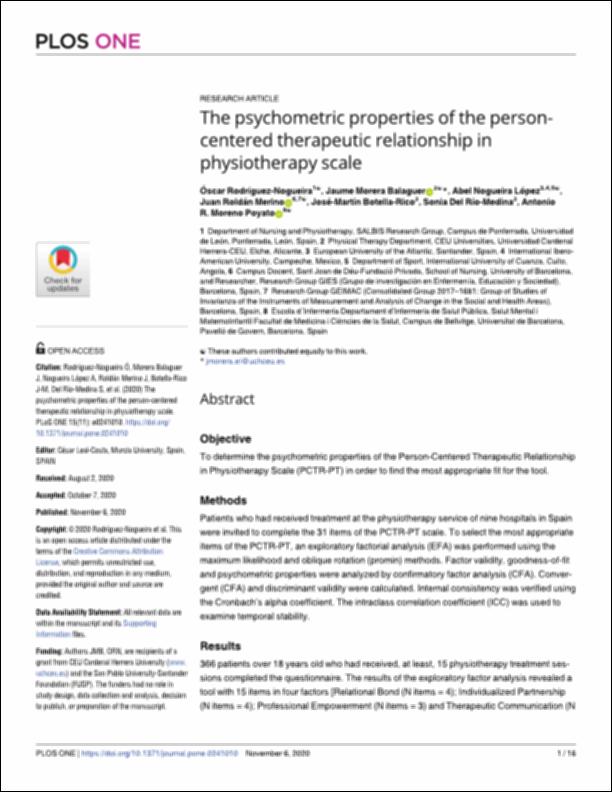Por favor, use este identificador para citar o enlazar este ítem:
http://hdl.handle.net/10637/12737The psychometric properties of the person-centered therapeutic relationship in physiotherapy scale
| Título : | The psychometric properties of the person-centered therapeutic relationship in physiotherapy scale |
| Autor : | Rodríguez Nogueira, Óscar Morera Balaguer, Jaime Vicente Nogueira López, Abel Roldán Merino, Juan Botella Rico, José Martín Río Medina, Sonia del Moreno Poyato, Antonio R. |
| Materias: | Fisioterapia - Tests.; Physical therapy - Psychological tests.; Fisioterapia - Modelos matemáticos.; Psychometrics.; Psicometría.; Physical therapy - Mathematical models. |
| Editorial : | PLOS. |
| Citación : | Rodríguez-Nogueira, Ó., Morera Balaguer, J., Nogueira López, A., Roldán Merino, J., Botella-Rico, J.M., Del Río-Medina S. et al. (2020). The psychometric properties of the person-centered therapeutic relationship in physiotherapy scale. PLoS ONE, vol. 15, i. 11 (06 nov.), art. e0241010. DOI: https://doi.org/10.1371/journal.pone.0241010 |
| Resumen : | Objective To determine the psychometric properties of the Person-Centered Therapeutic Relationship in Physiotherapy Scale (PCTR-PT) in order to find the most appropriate fit for the tool. Methods Patients who had received treatment at the physiotherapy service of nine hospitals in Spain were invited to complete the 31 items of the PCTR-PT scale. To select the most appropriate items of the PCTR-PT, an exploratory factorial analysis (EFA) was performed using the maximum likelihood and oblique rotation (promin) methods. Factor validity, goodness-of-fit and psychometric properties were analyzed by confirmatory factor analysis (CFA). Convergent (CFA) and discriminant validity were calculated. Internal consistency was verified using the Cronbach’s alpha coefficient. The intraclass correlation coefficient (ICC) was used to examine temporal stability. Results 366 patients over 18 years old who had received, at least, 15 physiotherapy treatment sessions completed the questionnaire. The results of the exploratory factor analysis revealed a tool with 15 items in four factors [Relational Bond (N items = 4); Individualized Partnership (N items = 4); Professional Empowerment (N items = 3) and Therapeutic Communication (N items = 4)], explaining 78.4% of the variance of the total variables of this tool. The confirmatory factor analysis further confirmed the four-structure model. Reliability of the tool was approved by Cronbach’s alpha in all four dimensions, as all were above .70, ranging from .84 (Individualized Partnership) to .91 (Professional Empowerment). = 0.94. Test-retest was performed with two-week intervals, indicating an appropriate stability for the scale (ICC = 0.900). Conclusion The Person-Centered Therapeutic Relationship in Physiotherapy Scale (PCTR-PT) is a useful, valid and applicable instrument to evaluate the person-centered therapeutic relationship during physiotherapy interventions. It would be interesting to investigate the predictive capacity (sensitivity and specificity) of the PCTR-PT scale. |
| Descripción : | Este artículo se encuentra disponible en la siguiente URL: https://journals.plos.org/plosone/article?id=10.1371/journal.pone.0241010 |
| URI : | http://hdl.handle.net/10637/12737 |
| Derechos: | http://creativecommons.org/licenses/by/4.0/deed.es |
| ISSN : | 1932-6203 (Electrónico). |
| Fecha de publicación : | 6-nov-2020 |
| Centro : | Universidad Cardenal Herrera-CEU |
| Aparece en las colecciones: | Dpto. Enfermería y Fisioterapia |
Los ítems de DSpace están protegidos por copyright, con todos los derechos reservados, a menos que se indique lo contrario.


